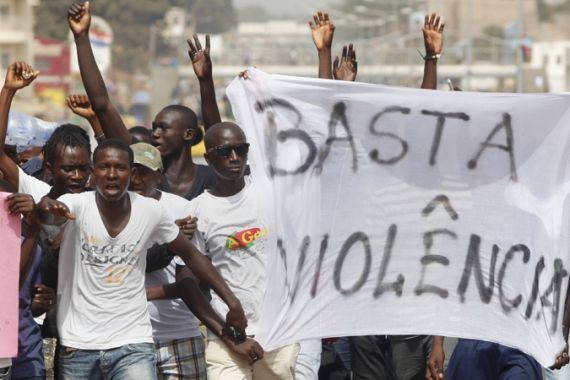Guinea-Bissau moves towards transition deal
Army and opposition to set up transitional body ahead of talks with regional bloc as workers call for general strike.

The Guinea-Bissau army and opposition parties have agreed to set up a transitional body to run the country, ahead of talks Monday with West African bloc ECOWAS, which has denounced the recent coup.
The news came before shortly before coup leaders said on Sunday that it was closing all air and sea borders.
That move was prompted by former colonial power Portugal’s announcement that it was sending two navy ships and a military plane for a possible evacuation of its nationals, which number between 4,000 and 5,000.
“Non-authorised Portuguese ships will not enter into our territorial waters. Guinea Bissau is a sovereign nation,” said Fernando Vaz, spokesperson for the parties of the former opposition, following a meeting between them and the new coup leaders.
The “military command” said in a statement that it had decided to shut down all air and sea access, without saying how long the measures would remain in place.
On the political front, all existing institutions will be dissolved to make way for a National Transitional Council, Vaz said.
The size and composition of the council and the length of its mandate will be determined at a meeting on Monday between the political parties, which will then take their proposals to the junta, Fernando Vaz, a spokesman for the opposition parties, said on Sunday.
The junta set the terms of the new administration earlier this week and told opposition parties that it would keep the defence and interior ministries in any new government.
According to Vaz, all existing institutions will be dissolved to make way for a National Transitional Council.
Two committees have been set up to run the country in the period leading up to the creation of the transitional council: one would handle diplomatic affairs and the other social issues.
ECOWAS talks
The diplomatic committee will meet on Monday with delegates from the Economic Community of West African States (ECOWAS), which has already denounced the coup and called for a return to constitutional rule.
ECOWAS has said that the presidential election, which the coup interrupted between the first round and a second-round run-off that had been scheduled for April 29, should be put back on track.
The final round had been due to take place between the then prime minister Carlos Gomes Junior and ex-president Kumba Yala.
Even before the coup however, Yala and other opposition leaders had denounced as fraudulent the result of the first round, which Gomes won comfortably, and had called for a boycott of the rest of the election.
The junta leaders have said they are holding both Gomes and Yala.
Under the terms the military set out to the opposition parties, the new arrangement with the former opposition specifically excludes the former ruling African Party for the Independence of Guinea-Bissau and Cape Verde (PAIGC), which has led the country for almost 10 years.
Call for general strike
In a sign of resistance to the coup leaders, the National Union of Workers of Guinea-Bissau (UNTG) which represents mainly public sector workers, issued a call for a general strike on Monday to protest the coup.
The union has around 8,000 members.
Earlier on Sunday, soldiers broke up a demonstration by some 30 people in front of the national assembly, where the talks were being held.
Also on Sunday, former colonial leader Portugal said two navy ships and a plane were on the way to West Africa to prepare for any eventual repatriation of Portuguese nationals from Guinea-Bissau.
According to Lisbon, between 4,000 and 5,000 Portuguese are currently in the country.
Since gaining independence in 1974, Guinea-Bissau’s army and state have remained in constant conflict, and no president has completed a full term in office. Three have been overthrown and one assassinated.
The tiny country with a multitude of islands has become a major transit point for cocaine from Latin America to Europe, and Washington has accused some senior military figures of involvement in the illicit trade.